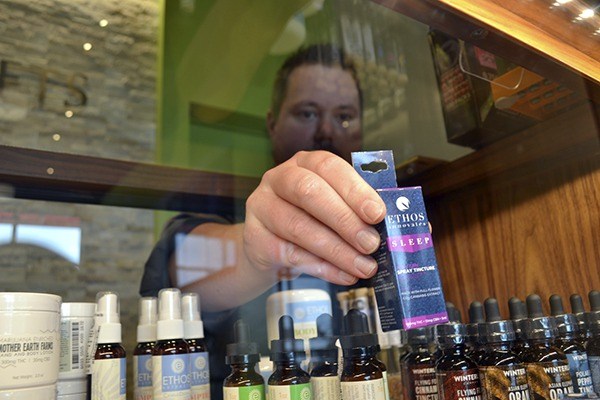This Friday, Sequim’s recreational marijuana shops make the changeover with the rest of the state to merge medical and recreational marijuana sales.
Karma Cannabis, 131 River Road, and Nature’s Gifts, 755 W. Washington St., are currently the only state-approved medical retailers as of July 1 in the Sequim area. Both are within the Sequim city limits, which has never allowed medical marijuana gardens or dispensaries.
By Thursday evening, collective medical marijuana gardens and dispensaries will cease operations statewide and only licensed businesses through the Liquor and Cannabis Board can sell marijuana.
Staff with Sequim’s closest medical dispensary, Olympic Sinsemilla, 256781 U.S. Highway 101, said the nonprofit will close on June 30. Their customers will either switch to shopping at recreational stores and/or grow from home with some stipulations.
Both of Sequim’s stores say they’ve been ready for the changeover, which requires a certified consultant from a 20-hour training program to intake new patients.
Matthew Clark, manager of Nature’s Gifts, said they’ve paid to certify and train their eight staffers and Anthony Owen, owner of Karma Cannabis, said he’ll have one liaison in Sequim at all times.
With the changeover, local retailers believe there will be an influx in business.
“We’re seeing new medical (clients) everyday,” Clark said. “A lot of medical people have never been in a recreational store before.”
Owen said he believes the influx at his businesses, which includes Port Angeles’ The Hidden Bush, will come from cancer patients seeking Rick Simpson oil, which has a high THC concentrate.
Consumers in the database will be allowed to buy products with high THC, up to 500 mg per package in capsules, tinctures, patches or suppositories, whereas recreational users can purchase up to 100 mg of THC contained in a product.
Medical consumers will now have to pay 37 percent excise tax on all marijuana products, which recreational users already pay. However, medical consumers can apply through the state for an exemption to the City of Sequim and state’s sales tax, currently at 8.7 percent in the city limits.
Both Clark and Owen said costs for edibles are a big concern for customers.
Clark said one customer may be consuming 300-500 mg a day of product but in the store they have to dose it in 10 milligrams.
However, Owen said prices for marijuana flowers and concentrates are around the same price point or better than the medical market.
Neither store is allowed to sell refrigerated items or instruct people how to make food items either, Clark said.
But with the Internet, information is readily available, Owen said, and legislation “doesn’t say anything about pointing people in the right direction.”
As for the state’s preparedness level, not everything is quite where it should be, retailers say.
Clark said processors haven’t moved forward with labeling products specifically for medical use even though legislation states at least 25 percent of product in a store must be medically compliant.
He said that to be medically compliant, the product, which varies greatly, must receive additional testing for items like pesticides.
“A year from now, everything will be (medically) certified,” Clark said. “Once it’s done though, they’ll have a safer product.”
State guidelines
Merging recreational and medical marijuana stems from House Bill 5052 in April 2015, which allows every licensed marijuana retailer the opportunity to apply for a medical endorsement.
If medical marijuana patients choose to use a recreational store for their products, they’ll need to receive authorization from their health care practitioner and so will the business.
From there, a state-certified consultant from the business will enter the patient into a database, which the Liquor and Cannabis Board states is private and doesn’t violate HIPAA.
Registration is voluntary and consumers can choose any state-approved store to register and/or shop.
Authorized patients opting not to register can grow up to four plants and possess up to six ounces of marijuana from those plants, the Liquor and Cannabis Board states.
Those not in the database can only purchase the same amount as recreational-only customers — up to one ounce of dried marijuana, seven grams of concentrates, 16 ounces of infused edibles and 72 ounces of infused liquids.
Patients in the database can keep eight ounces and six plants and with special approval from a doctor some patients can have up to 15 plants and 16 ounces of marijuana. If patients are 21 or older and in the database, they can purchase up to three ounces of marijuana, too.
Additionally, up to four patients in the database can join together to form a cooperative garden and grow up to 60 plants. This remains illegal in Sequim city limits but in Clallam County, Steve Gray, deputy director of Community Development, said there isn’t any code prohibiting this so long as the individuals follow state guidelines where the grow must be at the home of one of the members, at least one mile from a retail store and and at least 1,000 feet from where children reside.
For more information on the merger, visit www.liq.wa.gov/mmj/med-mj-transition.
Medical database may not be ready by July 1
The Department of Health, who oversees and is developing the medical marijuana database, reported Tuesday that software challenges may result in the program not being ready on Friday, July 1.
The database allows state-approved retailers to produce recognition cards for medical marijuana consumers to purchase products sales-tax free along with other benefits. However, consumers won’t be able to access these benefits until the database is operational.
The Department of Health will release an update no later than Thursday if it cannot meet the deadline.
Reach Matthew Nash at mnash@sequimgazette.com.



